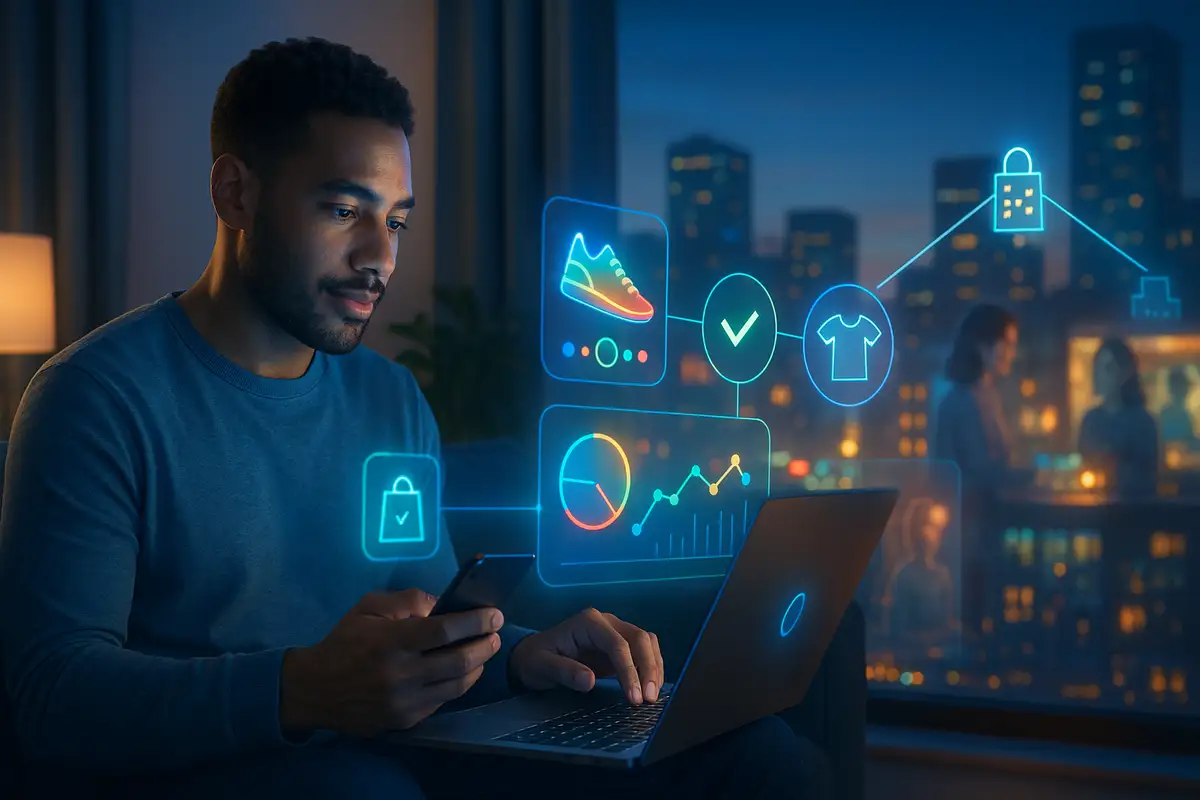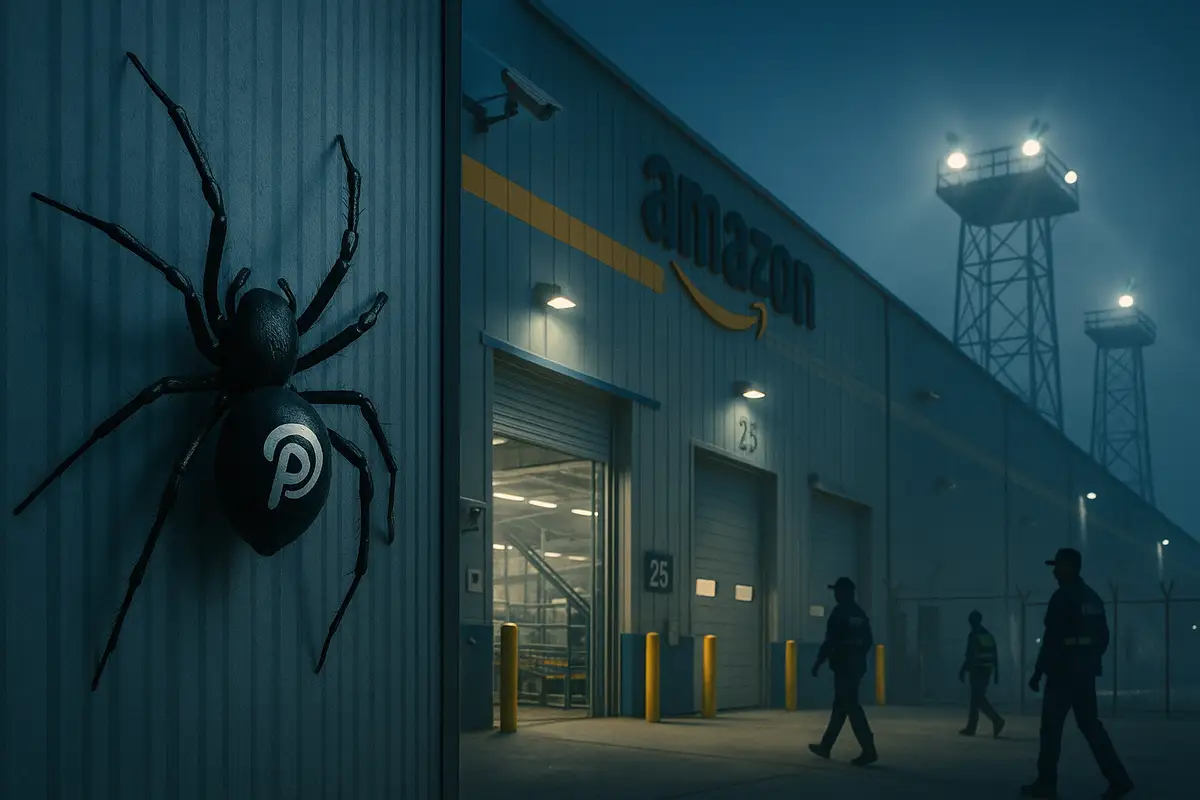OpenAI released a shopping assistant Monday that finds the right product 64% of the time. The company frames this as a breakthrough. In statistics, that's a D grade.
The timing tells the real story. OpenAI lost $5 billion in 2024, according to The Information. Internal documents project a $74 billion loss by 2028, per The Wall Street Journal. Company needs $1 trillion in valuation by 2030 to justify its infrastructure commitments. Against this backdrop, launching a free shopping tool makes perfect sense. If you understand what they're actually building: not a shopping assistant, but a funnel toward affiliate revenue that doesn't exist yet.
Shopping Research, as OpenAI calls it, runs on a fine-tuned GPT-5 mini model. Users describe what they want. System asks clarifying questions, shows products Tinder-style for swiping feedback, then generates a "personalized buyer's guide" after three to five minutes of processing. Experience launched globally Monday for all logged-in users, free through the holidays.
Here's what OpenAI isn't emphasizing: Amazon has blocked their crawlers from accessing product listings. The world's largest e-commerce platform, where 40% of online shopping happens, is effectively invisible to OpenAI's shopping bot. When asked about specific Amazon products during testing, ChatGPT suggested users "manually check if they're available on Amazon."
Not a shopping assistant. A search engine with extra steps.
The Breakdown
• OpenAI's Shopping Research finds correct products 64% of the time, up from 37% baseline
• Amazon blocked OpenAI's crawlers, making 40% of e-commerce invisible to the tool
• Company lost $5B in 2024, projects $74B loss by 2028, needs new revenue streams
• No instant checkout despite earlier partnerships with Walmart and Target
The Reddit Gospel and Other Delusions
OpenAI's solution to the fake review problem? Revealing. Can't distinguish authentic reviews from paid promotions, so the company trained its model to prioritize Reddit comments. "Organic" and "trustworthy," they call them. Manuka Stratta, an OpenAI researcher, told reporters that "generally a lot of reviews on Reddit are pretty trustworthy."
Reddit hosts anonymous coordination. Stock manipulation threads. Review brigading campaigns. Corporate astroturfing that would make Don Draper blush. Same platform that took $60 million annually from Google for content access. Has its own deal with OpenAI too.
But sure. Gospel truth.
Model actively avoids showing results from Temu unless specifically requested. Surfaces obscure brands over established retailers. During press demonstrations in New York, reporters noted the recommendations seemed random. One journalist searching for an air fryer? Got suggestions for models that weren't particularly well-reviewed or popular. Another asking for Disney gifts got nothing but Mickey Mouse merchandise. Everything Mickey. No nuance.
PCMag's Emily Forlini called the experience "half-baked" after her couch search returned a broken West Elm link. Led to "a strange version of the company's website, with no price listed, and no place to click to buy."
Processing takes up to five minutes. Google Shopping? Instant.
OpenAI claims this addresses how "hundreds of millions of people use ChatGPT to find, understand, and compare products." Already had Google for that though. Their tool isn't faster. Isn't more accurate. Different isn't better when different means worse.
The Instant Checkout Shell Game
Earlier this year, OpenAI announced partnerships. Walmart, Target, select Shopify merchants for "Instant Checkout." One-click purchasing directly within ChatGPT. Feature launched with fanfare about revolutionizing e-commerce.
Shopping Research doesn't include Instant Checkout.
Explanations shift depending on audience. Reporters heard they didn't have time to enroll merchants before holidays. Blog post promises future integration. Technical discussions reveal the real reason: without universal merchant adoption, the checkout system would need to guess its way through different payment flows on different sites.
Company claiming to build artificial general intelligence. Can't figure out how to complete a purchase order.
This matters. Instant Checkout represents OpenAI's only clear path to transaction fees. Without it, Shopping Research is just an expensive recommendation engine. Sends users to other sites to complete purchases. Company insists it's not taking affiliate commissions. That stance? Unlikely to survive their financial reality.
Twenty million paying subscribers out of 800 million weekly users. A 2.5% conversion rate. ChatGPT Plus costs $20 monthly. Roughly $4.8 billion annually if every subscriber pays full price. Against $5 billion in losses.
Math is brutal. OpenAI needs new revenue streams. Shopping commissions are the obvious play.
The 64% Solution
OpenAI's own metrics undermine their pitch. Standard ChatGPT found correct products 37% of the time. Shopping Research boosts that to 64%. Revolutionary progress, they say.
What's 64% accuracy mean practically? Ask for a laptop with specific requirements. There's a 36% chance it shows you tablets. Or Chromebooks. Or machines that don't meet your specifications. Request running shoes for flat feet? One in three times, you get regular sneakers.
Model can't distinguish between real and fake reviews. Admits to making mistakes about pricing and availability. Suggests users verify details on merchant sites. Not bugs to be fixed. Fundamental limitations of scraping web content without direct inventory integration.
Isa Fulford leads OpenAI's shopping team. Acknowledged that identifying legitimate reviews is a "pretty hard task." Said it's "impossible to get it 100% correct." Same company suggesting their technology will transform the economy.
Demonstrations showed the system's priorities. Asked for gifts for someone who loves reading, has a small dog, just moved, wants to travel, likes Mickey Mouse. Returned Mickey Mouse everything. Nuance of human preference? Ability to weight interests appropriately? Collapses into keyword matching.
Strategic Friction
OpenAI needs Shopping Research to work. Existential reasons. Infrastructure commitments require massive revenue growth. They're exploring advertising, enterprise subscriptions, usage-based pricing models. Shopping? Most immediate opportunity. E-commerce generates $5.8 trillion annually. Affiliate commissions typically run 3-8% of purchase price.
Launched without infrastructure to capture that value though. No checkout integration. No access to Amazon's catalog. Can't verify inventory or pricing. No protection against fake reviews beyond "trust Reddit." Processing times that lose users before completion.
Press event revealed gaps. Reporters testing the system found recommendations from brands they'd never heard of. Not boutique producers. Not craft makers. Obscure drop-shippers. White-label importers. Model's training to avoid "low-quality" sites? Paradoxically leads toward unknown retailers over established platforms.
OpenAI claims the tool excels at "detail-heavy categories like electronics, beauty, home and garden." Precisely the categories where Amazon dominates. 50-70% market share. Shopping assistant can't shop where most shopping happens.
Pattern emerges. OpenAI announces features before they're ready. Launches with missing core functionality. Promises future improvements. Moves on to next announcement. Instant Checkout partners? Walmart and Target weren't integrated with Shopping Research at launch. Company had months to prepare. Couldn't connect its own features.
The Convenience Trap
ZDNET's Sabrina Ortiz? She had fun. Called it entertaining, engaging, worth trying. Appreciated the product swiping interface. ChatGPT's gift suggestions impressed her. Enthusiasm matches OpenAI's intended narrative perfectly. Problem is, engagement doesn't generate revenue.
OpenAI burns through Microsoft's investment. Competes against Google, which already has shopping infrastructure. Has merchant relationships. Transaction processing. Amazon developed Rufus, its own AI shopping assistant. Blocks competitors from accessing its catalog simultaneously.
Strategic positioning? Incoherent. OpenAI markets this as a research tool for considered purchases. Takes minutes to generate recommendations. Built it on GPT-5 mini though. Their lightweight model. Optimized for speed over accuracy. Promise personalization while admitting frequent errors about basic product attributes.
Free through holidays means paid later. OpenAI will likely gate Shopping Research behind ChatGPT Plus subscriptions. Or implement usage limits. Question becomes: who pays for 64% accuracy when Google Shopping exists?
The Infrastructure Gap
Missing pieces compound. OpenAI built a shopping tool without inventory access. Without pricing feeds. Without merchant partnerships that matter. Without the ability to complete transactions.
Google has Shopping Graph. 35 billion product listings updated hourly. Direct feeds from merchants. Payment processing through Google Pay. Fifteen years of commerce infrastructure.
Amazon has everything. Inventory, logistics, payment processing, customer data. Knows what you bought, what you returned, what you browsed. AI shopping assistant with perfect information.
OpenAI has web scraping. And hope.
Fundamental problem extends beyond shopping. Company raised billions promising artificial general intelligence. Delivered chatbots. Raised more billions promising reasoning breakthroughs. Delivered incremental improvements. Now promising shopping revolution. Delivering 64% accuracy.
Investors notice patterns eventually.
Revenue Desperation Meets Reality
Look closer at the product decisions. GPT-5 mini instead of their best model. Why? Cost. Running the full model for shopping queries would accelerate their burn rate. Free through holidays? Customer acquisition play. Get users hooked before monetization.
Except users won't get hooked on broken experiences. Five-minute wait times kill impulse purchases. Missing Amazon kills product discovery. 36% error rate kills trust.
OpenAI knows this. Internal metrics showed 37% accuracy with standard ChatGPT. Improved to 64% with specialized training. Shipped it anyway. Desperation overruled product quality.
Media coverage splits predictably. Tech press amplifies the announcement. ZDNET finds it delightful. OpenAI's PR works. But PCMag calls it half-baked. CNET remains unimpressed. Users will side with skeptics once novelty fades.
Holiday shopping provides cover. People try new things when gift-giving. Tolerance for imperfection increases. Come January, when OpenAI implements restrictions? Different story.
Why This Matters
Shopping bot isn't about shopping. It's a revenue play from a company hemorrhaging cash. The 64% accuracy rate isn't a starting point for improvement. It's likely close to the ceiling given architectural constraints.
Investment thesis crumbles if OpenAI can't monetize beyond subscriptions. Shopping seemed like an obvious win. E-commerce is massive. Commissions are proven. Infrastructure seemed secondary.
Wasn't secondary. Was fundamental.
Amazon and Google don't need OpenAI's language models to build shopping assistants. They have inventory data. Transaction history. Customer behavior. OpenAI needs their data to build anything useful. They won't get it.
Competitors already won this race. Before it started. OpenAI just doesn't know it yet.
Feature generates buzz through holidays. Tech enthusiasts share quirky recommendations. Some users find genuine value for gift ideas. When OpenAI starts charging? When novelty evaporates? When people realize five minutes for 64% accuracy is a bad trade?
Usage craters.
OpenAI's fundamental problem isn't technical. Economic. Burning cash to build features without revenue models. Launching products that can't access essential data. Promising revolutions while delivering tools that fail more than a third of the time.
Shopping Research is what a $5 billion loss looks like when it tries to justify a trillion-dollar future. Math doesn't work.
Neither does the shopping bot.
❓ Frequently Asked Questions
Q: How exactly does OpenAI's Shopping Research work?
A: Users describe what they want, then answer clarifying questions about budget and features. The tool shows products Tinder-style for swiping feedback. After 3-5 minutes of processing, it generates a personalized buyer's guide. The whole process uses GPT-5 mini trained specifically for shopping tasks.
Q: Why can't ChatGPT access Amazon products?
A: Amazon updated its robots.txt file to block OpenAI's crawlers, including those for model training and real-time browsing. This means 40% of e-commerce is invisible to ChatGPT. Amazon is developing its own AI assistant, Rufus, and has taken legal action against competitor Perplexity's shopping tool.
Q: What's the deal with Reddit being considered "trustworthy" for reviews?
A: OpenAI trained its model to prioritize Reddit comments as "organic" reviews since it can't distinguish real reviews from fake ones. This is ironic given Reddit's $60 million annual content deal with Google and separate partnership with OpenAI. Reddit hosts coordinated review campaigns and astroturfing operations.
Q: How much will Shopping Research cost after the holidays?
A: OpenAI hasn't announced pricing but will likely gate it behind ChatGPT Plus ($20/month) or implement usage limits. The company currently has only 20 million paying subscribers out of 800 million weekly users, generating roughly $4.8 billion annually against $5 billion in losses.
Q: What is Instant Checkout and why doesn't Shopping Research include it?
A: Instant Checkout lets users buy directly in ChatGPT from partners like Walmart and Target. Shopping Research doesn't include it because OpenAI couldn't integrate merchants in time for holidays. Without universal adoption, the system would need to guess through different payment flows on each site.

















